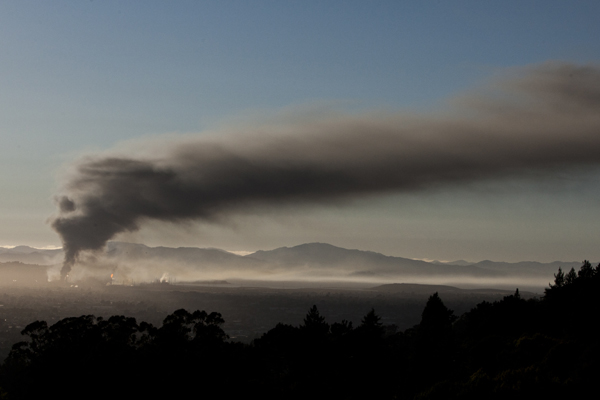This post has been updated to correct information concerning the Ecuadorian lawsuit against Chevron.
In the wake of last night’s fire at Chevron’s oil refinery in Richmond, community members are asking questions about exactly what happened, what health risks the public was exposed to, and whether the facility is safe.
Tonight [Tue/7], they’ll get a chance to ask those and other questions of Chevron representatives as the company hosts a townhall meeting at 6pm, preceded by a rally called by Asian Pacific Environmental Network at 5:30, both at Richmond Memorial Auditorium, 403 Civic Center Plaza, Richmond.
The fire ignited just before 6:30pm and burned for more than three hours before it was contained. As the fire burned, thousands of residents were warned to stay indoors, seal off all doors and windows, and, preferably hiding in rooms with no windows or doors within their homes.
This morning, Chevron spokesperson Heather Kulp reported that a preliminary investigation showed that the fire was a result of a hydrocarbon vapor leak that ignited. She denied that any explosion occurred, despite witness reports that they heard loud booms.
“There was an ignition. That may be what people are talking about hearing,” she told ABC.
On KQED’s Forum program this morning, she implied that an expansion of the plant that was stalled by the courts after being challenged by environmentalists — which she termed an “upgrade” — might have prevented the fire. But that notion by dismissed by Communities for a Better Environment, which said in a prepared statement, “This crude unit was not part of what it was going to replace.”
They and others were also skeptical of company assurances that the fire never presented a danger to the community. “We do have in place comprehensive plans and procedures to respond to situations like the ones we are facing this evening, and we are taking appropriate measures necessary to provide for the safety and security of our facilities, our employees and our surrounding community,” said the refinery’s general manger Nigel Hearne last night.
But APEN reports that a multi-lingual warning system that includes boxes installed in residents homes may have failed. “To compound Chevron’s lack of safety accountability in last night’s refinery fire/explosion, the multi-lingual warning systems that APEN and our allies fought for and won, failed. Many residents reported not being properly notified and are now experiences dizziness, headaches and other symptoms of exposure to toxins,” the statement reads.
More than 300 people flooded emergency rooms in the hours after the fire ignited complaining of respiratory problems. This is not the first time that Richmond residents have been affected by toxic fumes from the Chevron oil refinery. A similar fire happened in 2007 and burned for 10 hours.
Sierra Club put out a cautionary statement on the incident: “No one should have to live downwind of a dangerous oil refinery. Our thoughts are with the families living near the Chevron facility who must now contend with the aftermath and long-term health consequences of breathing in smoke filled with dangerous particulate matter, soot and cancer-causing toxins like sulfur compounds.”
Yeterday was already a bad day for Chevron — midnight was their deadline to pay a $19 billion settlement, to be paid into a fund managed by the Ecuadorian government, following a decades-long lawsuit. The company was found guilty of widespread land contanimation there, including releasing toxic water into rivers and streams, dumping waste in unlined pits, and frequent oil spills and gas flares.
The company did not pay by the midnight deadline.
“The plaintiffs will continue to seek enforcement of that ruling in other countries where Chevron has assets,” said Paul Paz y Mino, spokesperson for Amazon Watch.
Chevron claims that the ruling in Ecuador was invalid and based on fraud, and has refused to pay the settlement money. “The Ecuador judgment is a product of bribery, fraud, and it is illegitimate. Chevron does not believe that the Ecuador judgment is enforceable in any court that observes the rule of law,” reads a statement from the company.
“I don’t know if the two are connected in any way,” said Karen Hinton, spokesperson for the Amazon Defense Council. “But certainly the fire is in keeping with what we see in other countries, which is a disregard for the rule of law and an attitude of, if we can skirt safety regulations, we will.”

